
Indonesia should seize a chance of improving its defence-industry capability by stepping up cooperation with South Korea.
With four defence companies among the world’s top 100, South Korea shows that Indonesia can achieve its objective of lifting the scale and skills of its state-owned defence companies, which as a group are known as Defence Industry Indonesia (Defend ID).
After unwisely scaling down its participation in South Korea’s KF-21 fighter program, Indonesia should look at other opportunities for join development and production efforts. These should focus on equipment categories that both countries need.
In 2022 the Indonesian government set an ambitious target for Defend ID to be one of the world’s top 50 defence companies in 2024. Regardless of when that objective is achieved, probably not on time this year, South Korea has much of the technical know-how that Indonesia needs. Also, the two countries already have a defence cooperation agreement, which Indonesia ratified in 2018.
Altogether, South Korea is a far stronger candidate for defence-technology cooperation than such defence equipment suppliers as United States and European countries, which tend to see Indonesia as a customer rather than a partner in joint technology development.
So Indonesia’s decision to cut its involvement in the Korea Aerospace Industries KF-21 fighter program has been a mistake. Indonesia has asked to reduce its contribution from 1.6 trillion won to 600 billion won (from US$1.2 billion to US$440 million), out of a total KF-21 development cost of 8.1 trillion won. South Korea has agreed to the request.
Less funding from Indonesia means less technology transfer to it from South Korea and less opportunity for Indonesian aerospace engineers to learn about fighter development by being part of a program. This is know-how that Indonesia needs particularly for improving the capacity of its state aerospace company, PT Dirgantara Indonesia (PT DI). The company has been Indonesia’s industry-level partner in KF-21 development since 2011.
The KF-21 has also offered a chance for PT DI to gain experience in fighter manufacturing, a set of skills that is separate from development. That opportunity will presumably diminish now that Jakarta is paying less. PT DI does not currently make fighters or fighter parts, instead building only helicopters and propeller aeroplanes.
Indonesia looks like being little more than a customer for the KF-21 program.
Since that decision looks final, it’s time to look for new cooperation opportunities. President-elect Prabowo Subianto may be inclined to do so. He has a military background and is currently the defence minister.
If the armed forces of Indonesia and South Korea both need the systems that they jointly develop, the will provide a ready market for the products, and those products will help improve their military strength.
One project that Subianto’s government should consider is development of airborne early warning (AEW) aircraft. The Indonesian air force has no such aircraft, which many countries now regard as necessary for seeing distant air targets and especially those that are flying too low for detection by surface radar. Such capability is all the more important for Indonesia, whose land and maritime territory covers almost 2 million square kilometres.
The Indonesian Ministry of Defence reportedly gained approval from the Ministry of Finance early last year to buy two AEW aircraft, but the government has diverted the money to pay for frigates, instead.
South Korea’s air force operates imported US AEW aircraft; the country has not yet developed its own type. An opportunity for cooperation with Indonesia is therefore obvious.
Indonesia also needs more ground radars as it tries to strengthen air defences and to respond to repeated violations of its airspace by foreign military and civilian aircraft. At the end of 2023, the air force chief of staff revealed plans to acquire 25 new ground radars, far fewer than necessary. Again, this equipment requirement creates an opportunity for co-development with South Korea and improvement of Indonesia’s technical capacity.
A third opportunity is in uncrewed aircraft. The Indonesian air force has two squadrons with uncrewed aircraft. The government is negotiating to buy more from Turkish Aerospace Industries, but even more requirements are likely. So, again, Indonesia should propose working with South Korea to develop suitable types.
Indonesia needs know-how, and both it and South Korea need certain new defence equipment. They should work together to produce it.